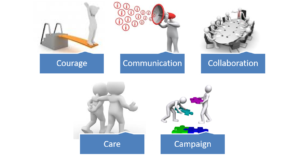
The various recent crises have put leadership and the leadership mindset under the spotlight around the world, from heads of state to business and public health leaders, we are all debating and assessing the quality of leadership we are experiencing.
In April 2020, just as LockDown was impacting around the world I was lucky enough to host a webinar on Leadership During Crisis Situations with General Sir Richard Shirreff, former second in command at NATO, Joanna Young, a former leader in the Metropolitan Police and Greg Reed, CEO of HomeServe UK.
A Crisis Reveals the Essence of Our Leaders
A crisis reveals the essence of our leaders: their judgement, personality, trustworthiness, integrity, empathy and compassion. A leader’s failure to meet the demands of a crisis is quickly obvious and trust is lost. Do people trust and follow the guidance they are given? Do they follow their lead? Or are they non-compliant, challenging and doubtful? Successful leaders generate a feeling of community and common purpose. Under poor leaders, consensus quickly fragments, people follow their own direction and organisation disintegrates.
The Five Cs for a strong leadership mindset
Following the event, I distilled required skills and leadership mindsets of leaders needed during a crisis down to 5 key factors which I call the Five Cs of Crisis Leadership:

Courage and Resilience
Courage in the face of uncertainty defines the best leaders – those who recognise the uncertainty they face but realise their role is still to provide guidance, assurance and decisions to their people. This courage requires personal resilience and strength, an ability to face the unknown and believe in one’s capacity to solve critical problems.
Collaboration
Rather than just being the directive ‘hero leader’ in the current crisis the successful leader needs to navigate disagreements, different personalities, stresses, motivations and values among the top team. In “You’re It”, Marcus et al explain that crisis leaders “coordinate a wide cast of characters into cohesive effort” which requires “understanding motives, finding common themes, building organisation and communication”.
Communication and Listening
Communication is perhaps the most visible area of focus for a leader during a crisis. Clear and consistent messages regularly communicated inspire trust and provide assurance. But the leader should not mistake this for providing all solutions. Vulnerable communication from a leader who is not afraid to admit that they do not have all the information today but has a credible plan will gain trust more than the leader who feels he/she needs to provide answers today, only for them to be proved incorrect tomorrow.
Caring for Others and Self
In a crisis people notice the leader who genuinely cares. During the Covid-19 crisis, those leaders and businesses who were only focused their own agenda have been dismissed quickly. In order to care for others, crisis leaders need to remember to care for themselves. Tired leaders make poor decisions and need to know when to step back to hand over to others
Campaign Thinking
‘Campaign thinking’ is about more than operational planning and helps leaders deal with cost-benefit trade-offs and the dilemmas and competing pressures that inevitably emerge. They anticipate scenarios and the responses of others, helping leaders to keep several moves ahead of events to avoid getting caught in a cycle of reaction.
You can download my White Paper on Leading During Crisis Situations and view the webinar here.
Leading During a Crisis: Leadership Mindset and Skills – written by Executive Coach Gary Storer works with Future Leaders who want to develop themselves for leadership roles. Gary help clients understand and develop the mindset, skills, personal characteristics and experience needed to take on challenging senior roles.
Read more blogs from Gary – Resilience: reshaping the stories we tell ourselves about our bad experiences

+ 4 more
Masters qualified coach developing leaders, future leaders and senior teams throughout UK